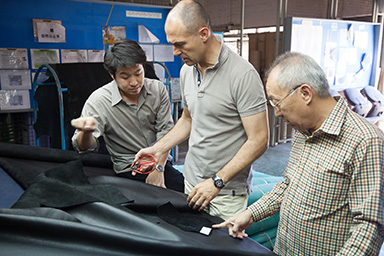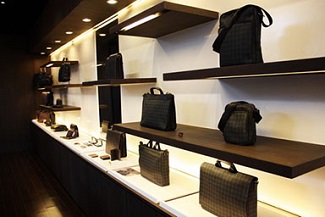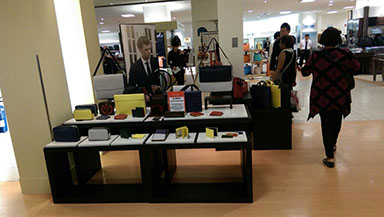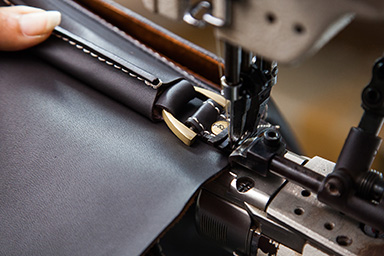
Select Page
In numerology, the number five is believed to be the most dynamic and energetic of all single-digit numbers. This holds especially true for MBP Leather Industries Co. Ltd. which started in 1982 with a team of employees that could literally be counted on one hand.
What began as a simple business of designing office desk accessories soon took MBP Leather to the international stage with its Albedo brand. There, it was accorded the recognition it deserved for its high-quality leather products.
Five years and 400 employees later, MBP Leather received a coveted invitation to display its luxe accessories at Asia’s biggest industry showcase, the International Exhibition of Shoes and Leather Industry, held in Guangzhou, PR China.
MBP Leather later topped that achievement when it found itself in the enviable position of being the first Asian brand to clinch an award for originality and quality at MIPEL, the world’s leading international leather goods show, in 2012 and 2014.
Not bad for a company that started out making leather pen holders for office executives. How it got to where it is today is the stuff business legacies are made of and a model of sound business acumen.
“My father (David Chiu) founded the company in 1982 as an original equipment manufacturer (OEM) for the US and Japanese markets,” explained Thanasut Chiu, MBP Leather’s Design and Production Manager.

Founder and Managing Director David Chiu
Thanasut, who had long harbored a love for fashion and lifestyle products, naturally joined his father as soon as he graduated and returned from the USA in 2006.
MBP Leather quickly branched into obtaining export contacts, organizing distribution for various US brands, and manufacturing premium leather products for the Japanese market.
With this increase in business, the company was operating very much the same way it began but on a much larger scale, producing an estimated 50,000–100,000 pieces of each style. Then the economic crisis hit and MBP Leather saw most of its clients and customers moving their production to PR China.
“My father realized that producing and driving our own retail product made better business sense in the long run compared to being an OEM,” Thanasut explained.

Thanasut Chiu (L) and father (R) discussing design
And that was when Thanasut’s father decided to introduce MBP Leather’s very own brand, Albedo. Many shook their heads at what they saw as a doomed strategy. Who in their right mind would introduce a new brand to a marketplace that was mired in frugality?
Thanasut was among the few who wasn’t the least bit surprised. His father had always taken great delight in doing the exact opposite of what others were doing.
“So while others were slowing down we were stepping up!” he smiled. “And that created vast room for opportunity.” True enough, it turned out to be a winning move.

Albedo leather goods penetrated the Japanese market

Albedo products have become a household name in Thai retail stores
MBP Leather forged ahead with its new business line and entrepreneurship innovation. It created a design and marketing team and began conducting research to understand the new target market.

Lean allowed raw products to be shaped into beautifully crafted pieces with a faster turnaround time
But what gave it the necessary power boost to emerge triumphant from this economic shake-up was the Training Course on Lean Production Systems provided by the Asian Productivity Organization (APO).
Established in 1961 as a regional intergovernmental organization, The APO is a nonpolitical, nonprofit, and nondiscriminatory union of 20 Asian-Pacific countries formed to promote socioeconomic development among its members. Among the APO’s aims are promoting productivity and competitiveness; particularly for SMEs.
MBP Leather also worked with the Thailand Productivity Institute to establish a lean production system. This opportunity came at time when the company was experiencing some setbacks and wanted a faster response to a long lead-time in production.
With this training assistance, MBP Leather improved production by introducing practices such as total quality management, kaizen, and 5S for greater workplace efficiency and effectiveness.
“The lean production system was created by the Japanese and to be able to learn from the creator’s culture was a golden opportunity,” Thanasut said.
Among the areas the company sought to improve were shorter lead-time, line balance efficiency, reduction of work in process, implementation of the kanban system (a scheduling system for lean and just-in-time production) and an overall improvement in standard time.
MBP Leather began with value stream mapping (VSM), which led to the discovery of excessive wastage in the production line. To correct this, the time was recorded for each process, which enabled the company to obtain the standard time.
Where the line balance efficiency issue was concerned, the initial 78.6% was brought up to an impressive 93% and by changing their production line into the cellular production, the initial eight or nine workers per production line was reduced to four workers per cell. This meant a reduction of 20–40% in production time for each product.
After they were successful in changing the production line, work began on implementing the kanban system.

The extra focus that went into producing smaller batches of products reduced the rejection rate from 8% to 1%
A total of 60 popular retail items were selected for this process and the results obtained were astounding. A three- to four-month period of production was reduced to one month and finally a target of 15 days was set and achieved.
“The programs taught us about smaller-scale production from 100 pieces per model to 20 pieces,” Thanasut noted. “The extra focus that went into producing those 20 pieces reduced our rejection rate from 8% to 1%.”
“By the time we launched the first production round for our new range, we had eliminated 90% of the problems that we faced in long-run production.”
To the casual observer, it seemed that MBP Leather had smoothly navigated past all possible obstacles, but Thanasut is quick to correct this notion.
“Of course we had challenges, and they revolved mainly around our employees. Trying to change their work habits and style was very, very hard.”
“We had to commit to weekly meetings with them to continuously explain the concept and benefits of the lean production system. But once they saw the improvements, they bought into the concept completely.”
With 30 years of business innovation to its name, MBP Leather together with the Albedo brand aspires, like all businesses with longevity, to better serve the needs of the customer.
With the fickle fashion industry changing its wants and trends so often, the company and brand both understand that success favors swift decisions.
The secret to Albedo’s success as a brand is includes the following: do what you do best; identify fashion trends before competitors do; think differently and never stop creating; and develop sewing and finishing techniques that no one else can do.
Testimony to this is that the company was the first manufacturer to use waterproof leather for bags. This happened as a result of innovation and a constant focus on product development and the creation of new brands. And it doesn’t stop there.
“Right now we have our eye on the Southeast Asian market and expect to expand through the rest of Asia within the next five to 10 years,” Thanasut said.
After sharing this vision, he allowed himself to indulge in a little reminiscing.
“I wasn’t afraid when I joined the company. I’ve watched how my father worked since I was a boy so I had an idea of how business is conducted. My only challenge was running a factory and changing the way our production was carried out.”
“So the biggest lesson I learned from the APO training was the art of working with different kinds of people and how to bring out the best in each one of them.”
With the will to excel and leveraging programs such as those offered by the APO, there is little doubt that MBP Leather and Albedo will be a company and brand constantly in motion, creating new opportunities and paving the way with innovation, style, and a whole lot of heart.
Photos courtesy of MBP Leather Industries Co. Ltd.
0 Comments